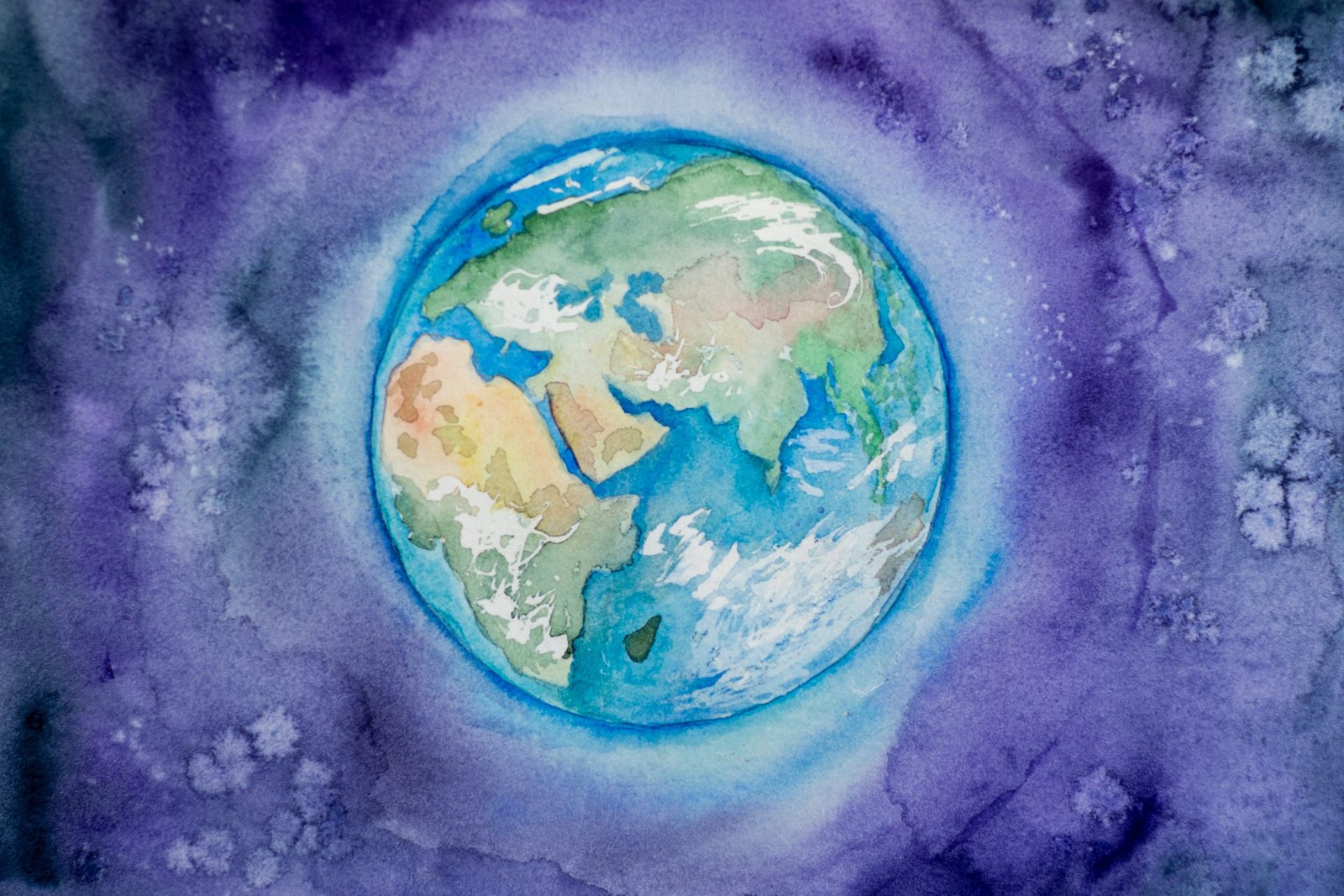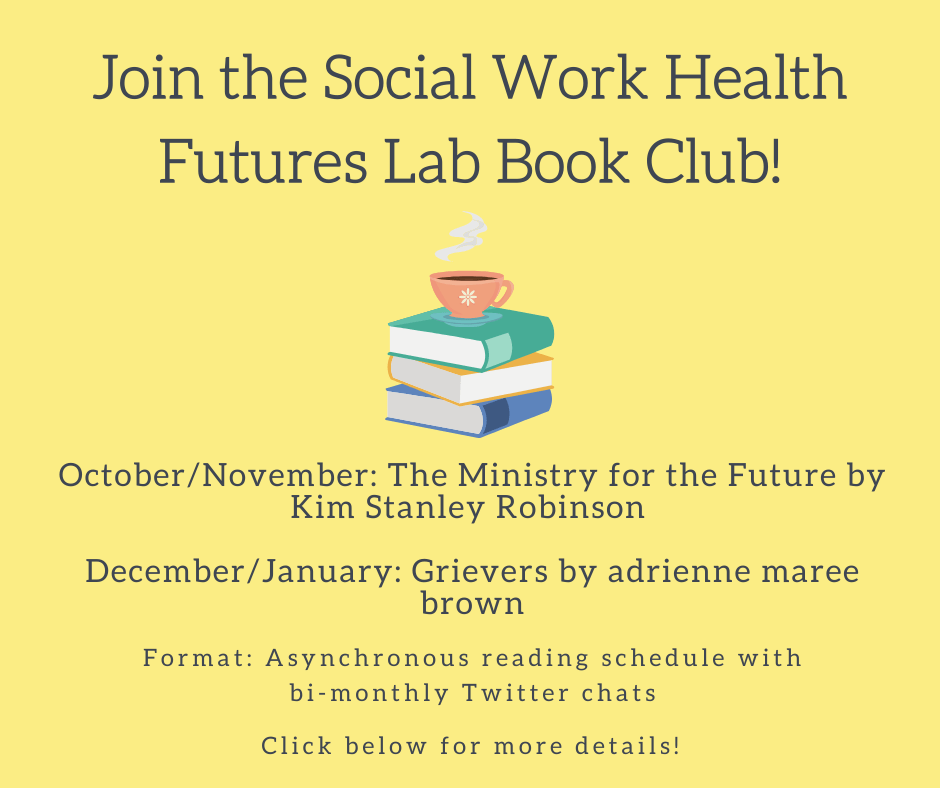What would it look like if social workers were futurists?
We are going to find out! Let’s complicate, disrupt, co-create, ideate, trouble, evolve and expand our repertoire of skills and ideas in health- and health-equity related social work practice, to be change agents in a rapidly changing ecosystem.
Futures Thinking and Foresight
Futures thinking and foresight practice are simultaneously an emerging social science, a global community of practice and a specific set of ideas and tools focused on democratizing the future in what some call “post-normal times.”
Social Work Health Futures Lab
Sponsored by the Robert Wood Johnson Foundation, and housed at Portland State University School of Social Work, this lab is an 18-month exploration and collaborative learning opportunity for social workers focused on the social determinants of health.

What are we?
A national learning collaborative to engage social work scholars and leaders in learning about and experimenting with futures and foresight frameworks to energize and expand health and health-equity related social work thinking and practice for a rapidly changing future.


Laura Nissen, Ph.D. LMSW
Director and Founder, Social Work Health Futures Lab. Professor and Presidential Futures Fellow, Portland State University
Jake Dunagan, Ph.D.
Director, Governance Futures Lab, Institute for the Future and Coach, Social Work Health Futures Lab


Emerging Social Work Challenges
Health is an epicenter of equity and justice in our world today. Covid-19, police violence towards communities of Color, and economic and structural oppression that are rapidly evolving, are all examples of essential health drivers and influences. This initiative will invite social workers to not only look at present circumstances but use futures thinking to consider how these and others may evolve in the years to come. It will also consider how they’ll intersect with other emerging social, technological, economic and global factors. We see the future of health and health equity as a dynamic space where we can make a difference if we’re able to see the social determinants of health with a futures lens.


The relationship of technology to human health and well-being
Rapidly changing technology is impacting everything from how people access care, to biotech-enabled body parts, to how people navigate their built and online environments. Social workers may be called up to create, to critique, and to use new technologies in the service of our practice objectives.
Use of artificial intelligence in relation to health (including the exploration of algorithmic racism).
Artificial intelligence (also related to machine learning and other terms), is an increasingly present part of our modern world. Yet some suggest that the racism, and other forms of bias we see in our everyday world can be even more dangerous when embedded in these types of technologies. Whether it is facial recognition technologies or algorithms making recommendations about types of services or eligibility based on calculated risk scores - social workers may be called upon to interact with, contribute to or push against use of these technologies.
Geopolitical issues shifting the nature of place and identity.
The geopolitical ecosystem is increasingly complex and contributes to increasing amounts of migration and vulnerability of individuals and families. Helping to resettle and create welcoming environments for those in transition is vitally important and when combined with such forces as climate change and global conflict, are estimated to increase in the years to come. Social workers may be called upon to develop new approaches, adhere to existing rules, or interrupt policies that do not reflect social work values.
The impact of climate change and climate justice on human health.
-
Climate change is impacting a wide variety of human well-being indicators - from mental and physical health, food shortages and availability, economic stability, and housing (even by moving entire communities due to climate vulnerabilities). Social workers may be called to both continue to deal with the impacts of climate change itself in these forms, as well as contribute to the development of green economic agendas that can increase physical and economic well-being.
The future of work for marginalized populations.
The future of work is a dynamic and rapidly changing space in which many jobs are in a state of transition. Increasing automation and use of smart technologies put many in the workforce at risk. Social workers may be called upon to assist in transitioning people whose jobs have been eliminated and/or replaced by these new technologies to alternative forms of work, developing new economic tools and resources to build training and work programs between different generations of work.
The access to and use of technology as a tool of power and set of health rights.
Access to and skills for using technology as a vehicle for information sharing, accessing benefits and resources, and full participation in society will be increasingly considered a human right. Social workers may be called upon to help people expand this access, develop programs and policies that protect these rights, and navigate patchworked accessibility in both public and private sector spaces.

Our blog
Stay up-to-date with out latest news, announcements, & stories on the Social Works Health Futures Lab blog. Subscribe on the blog or down below.
Therapy on the go: Mildly depressed or simply stressed, people are tapping apps for mental health care
Therapy on the go: Mildly depressed or simply stressed, people are tapping apps for mental health careIt might be surprising to think about browsing...
We Are Failing the Future on Climate Change
We Are Failing the Future on Climate ChangeSocial work has failed to meaningfully engage climate change. I would love to say we dropped the ball on...
Futures of Friendship
Futures of Friendship“O my friends, there is no friend (Derrida, 1993)” Who Are Friends?What are friends? A friend is defined in Merriam-Webster as...
What would the world look like if a social worker was the CEO of Meta?
What would the world look like if a social worker was the CEO of Meta?Photo by Efe Kurnaz on UnsplashImagine a world where technology and social...
A Critical Foresight-Informed Perspective on the Proposed 2022 CSWE EPAS (Educational Policy and Accreditation Standards) for Schools of Social Work in the U.S.
A Critical Foresight-Informed Perspective on the Proposed 2022 CSWE EPAS (Educational Policy and Accreditation Standards) for Schools of Social Work...
Changed plan fatigue, forecasting future(s), and finding the present
Changed plan fatigue, forecasting future(s), and finding the presentChanged Plan Fatigue I was on the phone with my mom recently, talking about an...
The Great Resignation: A Signal for the Future of Work
The Great Resignation: A Signal for the Future of Work By now, most people have heard of the Great Resignation i.e. a mass exodus of employees from...
Artifact from the Future: Glasses that enable you to see around corners
Artifact from the Future: Glasses that enable you to see around cornersI have just returned from the year 2036 where I saw people wearing these...
Social Work Health Futures Lab Book Club
Join our Social Work Health Futures Lab Book Club!Join members of the Social Work Health Futures Lab in a virtual book club! More information on how...
The Future of Social Work Education: Futures Thinking in MSW Curriculum
The Future of Social Work Education: Futures Thinking in MSW CurriculumWhere do you see yourself in 10 years? As graduate students who are deeply...








